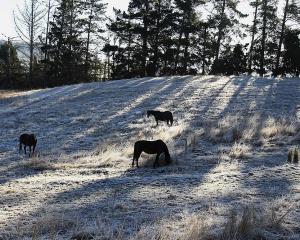Otago was cold, sunny and dry last month, with Dunedin, Balclutha, Cromwell and Queenstown reaching records for low temperatures or high sunshine hours, or both.
Frequent high pressure systems brought clear skies, dry conditions and warmer afternoons after colder mornings in many regions during July, a National Institute of Weather and Atmospheric Research (Niwa) national climate centre report says.
Conditions that are not likely to change much with Niwa's outlook for Otago in the next three months for above average temperatures and normal rainfall with the occasional short-term cold snap or frosty period.
Climate scientist Georgina Griffiths said sunshine totals were well above average across most of Otago and Southland for July, while below normal rainfall was recorded.
While temperatures were close to average in many places, in coastal Otago mean temperatures were below average by 0.5degC and 1.2degC, she said.
The national average as 7.7degC (0.2degC below the monthly average).
It was the sunniest July on record for Balclutha (146 hours, 152% of normal) and the highest equal for Cromwell (136 hours, 144% of normal).
Dunedin recorded its four highest hours for the month (139 hours, 138% of normal).
While it was rather dry around the region, Balclutha was the only place to reach record levels with its fourth lowest rainfall for July - 15mm, 28% of normal.
In other rainfall figures, Middlemarch received 9mm, 27% of normal, Tara Hills, 21mm, 41% of normal; Queenstown 41mm, 73% of normal.
An extremely cold spell affected New Zealand between July 10 and 13 caused by an intense winter anticyclone producing severe frosts, Ms Griffiths said.
Dunedin recorded its second lowest daily minimum air temperature -6.7degC on July 12 and Queenstown -7.2degC on the same day.
Mean temperatures were below normal, with Dunedin recording its lowest mean minimum of -2.4degC for July, -2.2degC lower than normal and Queenstown its second lowest with -3degC, -1.6degC below normal.
When compared with the other five main centres in New Zealand, Dunedin was the driest, having recorded only 27mm of rain (40% of normal).
Christchurch recorded 67mm, Wellington 119mm and Auckland 102mm.
Dunedin was also warmer than Christchurch's 5.4degC with its mean temperature 6.8degC.
Wellington recorded 8.2degC and Auckland 10.3degC.







